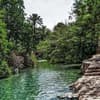Podcast
Questions and Answers
What are the three main particles that make up an atom?
What are the three main particles that make up an atom?
- Neutrons, electrons, and positrons
- Protons, electrons, and positrons
- Photons, electrons, and positrons
- Protons, neutrons, and electrons (correct)
In which type of chemical bond do atoms share electrons to achieve a stable electron configuration?
In which type of chemical bond do atoms share electrons to achieve a stable electron configuration?
- Covalent bond (correct)
- Metallic bond
- Ionic bond
- Polar covalent bond
What happens in an ionic bond?
What happens in an ionic bond?
- Atoms transfer protons
- Atoms transfer electrons (correct)
- Atoms share electrons
- Atoms share protons
What type of bond occurs in metals, where electrons are delocalized and can move freely?
What type of bond occurs in metals, where electrons are delocalized and can move freely?
Which type of bond is formed when ions are attracted to each other due to opposite charges?
Which type of bond is formed when ions are attracted to each other due to opposite charges?
What is the force that holds atoms together in a molecule?
What is the force that holds atoms together in a molecule?
Which of the following is a compound?
Which of the following is a compound?
What is an example of a physical change?
What is an example of a physical change?
Which substance is a mixture?
Which substance is a mixture?
What is the classification of matter into three states?
What is the classification of matter into three states?
What is the basic building block of matter that cannot be broken down by chemical reactions?
What is the basic building block of matter that cannot be broken down by chemical reactions?
Which change involves altering the chemical composition of a substance?
Which change involves altering the chemical composition of a substance?
What is the key characteristic of elements?
What is the key characteristic of elements?
Which process involves a change in the chemical composition of a substance?
Which process involves a change in the chemical composition of a substance?
What is the main characteristic of compounds?
What is the main characteristic of compounds?
Which statement accurately describes mixtures?
Which statement accurately describes mixtures?
What is the classification of matter into three states based on?
What is the classification of matter into three states based on?
What is the chemical composition of atoms?
What is the chemical composition of atoms?
Study Notes
Class 10 Chemistry Chapter 1: Introduction to Chemistry
Elements, Compounds, and Mixtures
Elements are the basic building blocks of matter. They cannot be broken down into simpler substances by chemical reactions. Some common elements include Hydrogen (H), Oxygen (O), Carbon (C), Nitrogen (N), and Calcium (Ca).
Compounds are formed when two or more elements bond chemically, resulting in a new substance with different physical and chemical properties. Examples of compounds include water (H2O), sodium chloride (NaCl), and sugar (C12H22O11).
Mixtures are a combination of two or more substances, where the substances maintain their separate identities. Examples of mixtures include air, which is a mixture of nitrogen, oxygen, and carbon dioxide.
Physical and Chemical Changes
Physical changes involve changes in the state of matter without altering its chemical composition. Examples include melting, boiling, burning, mixing, and cutting.
Chemical changes involve a change in the chemical composition of a substance, resulting in the formation of one or more new substances. Examples include rusting of iron, burning of hydrocarbons, and digestion of food.
Matter and its Classification
Matter is anything that has mass and takes up space. It can be classified into three states: solid, liquid, and gas.
Atomic Structure
The atomic structure refers to the arrangement of protons, neutrons, and electrons within an atom. Atoms are the fundamental unit of matter and consist of three main particles: protons, neutrons, and electrons.
Chemical Bonding
Chemical bonding is the force that holds atoms together in a molecule. There are three main types of chemical bonds: ionic, covalent, and metallic.
-
Ionic bonds occur when one atom transfers an electron to another atom, resulting in the formation of ions. The ions are then attracted to each other due to opposite charges.
-
Covalent bonds occur when atoms share electrons to achieve a stable electron configuration.
-
Metallic bonds occur in metals, where electrons are delocalized and can move freely throughout the material, allowing the positive ions to move freely in the sea of electrons.
In conclusion, Class 10 Chemistry Chapter 1 introduces the basic concepts of chemistry, including elements, compounds, and mixtures, as well as the physical and chemical changes they undergo. The atomic structure and chemical bonding are also discussed, providing a foundation for further study in the field of chemistry.
Studying That Suits You
Use AI to generate personalized quizzes and flashcards to suit your learning preferences.
Description
Test your knowledge of the basic concepts of chemistry, including elements, compounds, mixtures, physical and chemical changes, matter classification, atomic structure, and chemical bonding.





